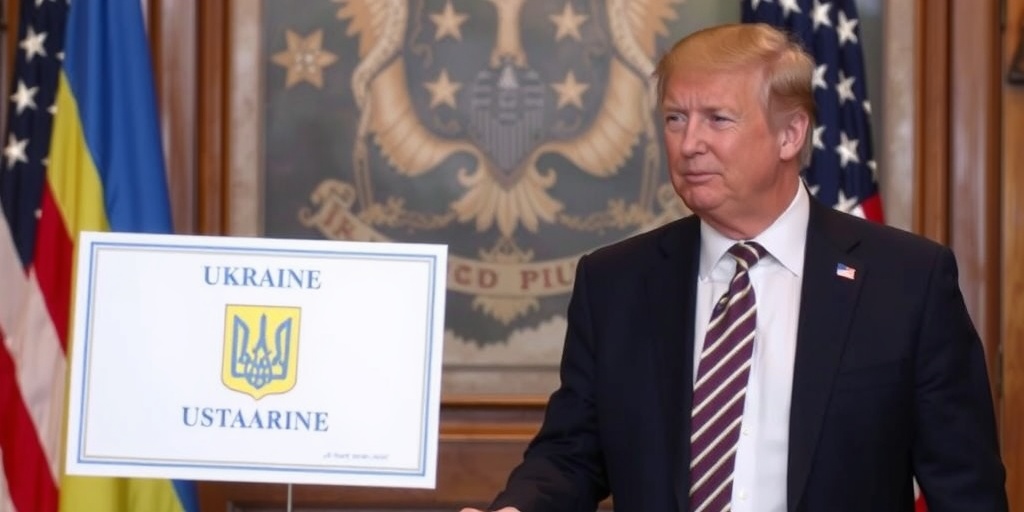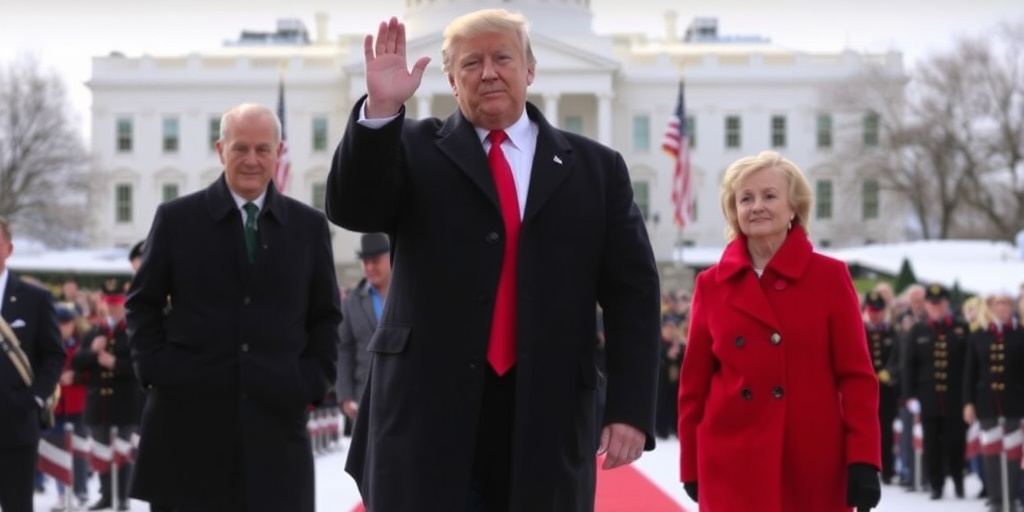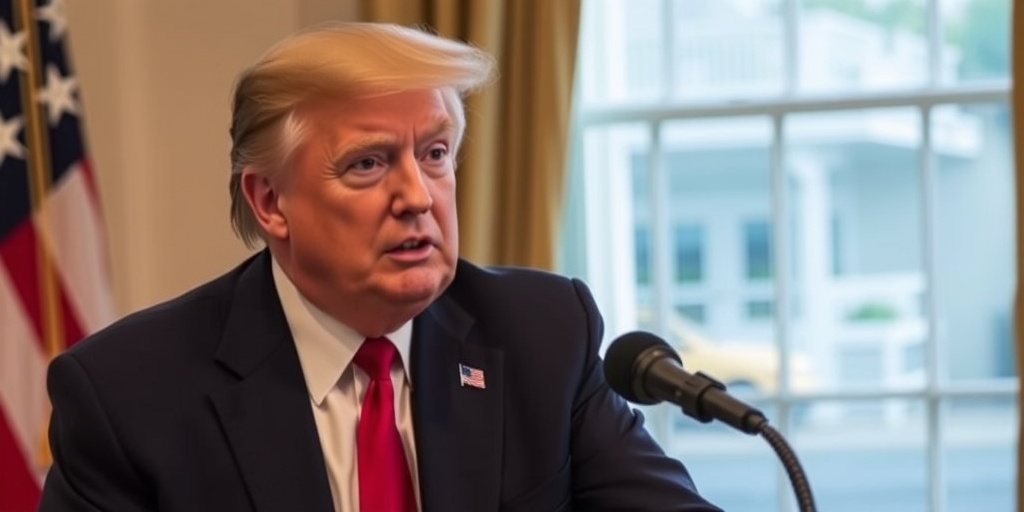Now Reading: U.S. Ambassador to Ukraine Resigns Amid Trump-Related Tensions
-
01
U.S. Ambassador to Ukraine Resigns Amid Trump-Related Tensions
U.S. Ambassador to Ukraine Resigns Amid Trump-Related Tensions

U.S. Ambassador to Ukraine, Bridget A. Brink, Announces Departure Amid Strained Relations
The U.S. ambassador to Ukraine, Bridget A. Brink, is set to leave her post, as announced by the State Department on Thursday. Brink’s decision to step down comes at a particularly delicate time in the relationship between Washington and Kyiv, which has faced numerous challenges, especially in light of the evolving foreign policy under the Trump administration.
In a statement, a State Department spokesperson confirmed Brink’s departure, stating, "Ambassador Brink is stepping down. She’s been the ambassador there for three years—that’s a long time in a war zone." The lengthy tenure of an ambassador in a conflict-ridden country is noteworthy, especially as it pertains to the ever-changing dynamics of diplomatic relations amid ongoing military challenges.
Tammy Bruce, the State Department’s chief spokeswoman, later addressed Brink’s departure during a press briefing, expressing best wishes for the ambassador’s future endeavors. However, she did not elaborate on the specifics surrounding Brink’s resignation. As of the announcement, Brink was not available for immediate comment, leaving many questions unanswered regarding the circumstances that led to her exit.
The ambiguity surrounding her departure raises concerns. It is unclear whether Brink left of her own accord or was asked to resign as part of the new Trump’s administration’s policies, or perhaps it was a combination of both. President Trump has made notable adjustments to the United States’ stance on Ukraine since his administration began, which includes the temporary halting of military aid to Kyiv and pushing for a controversial agreement that would grant U.S. interests significant stakes in Ukraine’s minerals and energy resources.
Currently, the exact timeline for Brink’s departure has not been disclosed, nor is there information on her successor. The role of the U.S. Ambassador to Ukraine is critically vital, particularly in the context of Russia’s ongoing military actions in the country. The ambassador plays an essential role in coordinating military and financial support, which has been central to Ukraine’s defense efforts against Russian aggression.
The announcement of Brink’s departure coincided with a Ukrainian delegation traveling to Washington, D.C. to engage in negotiations concerning the aforementioned minerals deal. Trump has framed this agreement as a method for the U.S. to "recoup" funds previously allocated in aid to Ukraine, heightening the stakes for this negotiation.
Brink’s resignation is a reflection of the heightened tensions present in U.S.-Ukraine relations, which have arguably reached their most strained point since the initiation of the war. The catalyst for much of this discord can be traced back to a notably contentious Oval Office meeting in February 2025, during which President Trump and Vice President JD Vance accused Ukrainian President Volodymyr Zelensky of inadequate gratitude for the assistance provided by the U.S. administration. This criticism was compounded by several White House officials echoing Russian narratives, further aggravating the situation for Ukrainian officials.
Bridget A. Brink was nominated to her post by former President Joe Biden and took up her duties in Kyiv in May 2022. During her time in Ukraine, she actively utilized social media and public appearances to voice support for Ukraine’s battle against Russian aggression. Her advocacy extended beyond diplomatic norms, where she positioned herself as a strong proponent for reforms aimed at combating corruption within the Ukrainian government—an approach that occasionally put her at odds with certain government officials who interpreted her advocacy as undue American interference.
In recent months, as the political climate shifted with Trump’s arrival in office, Brink found herself navigating a complex landscape of foreign policy changes. The Trump administration adopted a more neutral stance regarding the conflict between Ukraine and Russia, demanding an adjustment in Brink’s strategies.
This new dynamic was particularly noticeable following a tragic Russian missile attack on Kryvyi Rih, which resulted in the deaths of 19 individuals, including nine children. Brink condemned the assault publicly but faced backlash for not explicitly naming Russia as the aggressor. This omission drew sharp criticism from President Zelensky, who challenged Brink, emphasizing that such silence could incentivize further Russian aggression.
Subsequent to the criticism, Brink revised her messaging to address the situation more pointedly, acknowledging Russia’s responsibility in another post about a different missile strike. In a gesture to honor the victims of the Kryvyi Rih attack, she visited the town just days after the incident.
The developments surrounding Ambassador Brink’s departure signify a tumultuous period in U.S.-Ukraine relations, underscoring the fragility of diplomatic efforts in a context of ongoing conflict and shifting political allegiances. As the search for her successor begins, the future of U.S. involvement in Ukraine remains uncertain, raising critical implications for the strategic partnership essential in an era marked by persistent geopolitical tensions.
Stay Informed With the Latest & Most Important News
Previous Post
Next Post
-
 01New technology breakthrough has everyone talking right now
01New technology breakthrough has everyone talking right now -
 02Unbelievable life hack everyone needs to try today
02Unbelievable life hack everyone needs to try today -
 03Fascinating discovery found buried deep beneath the ocean
03Fascinating discovery found buried deep beneath the ocean -
 04Man invents genius device that solves everyday problems
04Man invents genius device that solves everyday problems -
 05Shocking discovery that changes what we know forever
05Shocking discovery that changes what we know forever -
 06Internet goes wild over celebrity’s unexpected fashion choice
06Internet goes wild over celebrity’s unexpected fashion choice -
 07Rare animal sighting stuns scientists and wildlife lovers
07Rare animal sighting stuns scientists and wildlife lovers





















